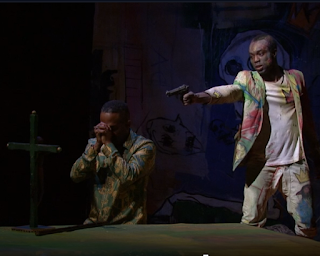Changing Interpretations Over Time: Samuel Taylor Coleridge
Double whammy today: not one, but two extracts from the poet Samuel Taylor Coleridge (1772-1834), best known for the Rime of the Ancient Mariner and Kubla Khan - which the online Encyclopedia Britannica labels 'two of the greatest poems in English literature'. He was a mover and shaker within the Romantic movement, and good mates with Wordsworth. It is probably worth reading a little more about the Romantics before you move on, since some of the ideology is reflected here in Coleridge's words. The British Library is a good place to start.
S. T. COLERIDGE: from Lectures on Shakespeare, 1818
IN Hamlet he [Shakespeare] seems to have wished to exemplify the moral necessity of a due balance between our attention to the objects of our senses, and our meditation on the workings of our minds, - equilibrium between the real and the imaginary worlds. In Hamlet this balance is disturbed: his thoughts, and the images of his fancy, are far more vivid than his actual perceptions, and his very perceptions, instantly passing through the medium of his contemplations, acquire, as they pass, a form and a colour not naturally their own. Hence we see a great, an almost enormous, intellectual activity, and a proportionate aversion to real action, consequent upon it, with all its symptoms and accompanying qualities. This character Shakespeare places in circumstances, under which it is obliged to act on the spur of the moment: - Hamlet is brave and careless of death; but he vacillates from sensibility, and procrastinates from thought, and loses the power of action in the energy of resolve. Thus it is that this tragedy presents a direct contrast to that of Macbeth; the one proceeds with the utmost slowness, the other with a crowded and breathless rapidity. The effect of this overbalance of the imaginative power is beautifully illustrated in the everlasting broodings and superfluous activities of Hamlet's mind, which, unseated from its healthy relation, is constantly occupied with the world within, and abstracted from the world without, - giving substance to shadows, and throwing a mist over all commonplace actualities.
S.T. COLERIDGE: from Table Talk, 24 June 1827:
HAMLET'S character is the prevalence of the abstracting and generalizing habit over the practical. He does not want courage, skill, will, or opportunity; but every incident sets him thinking; and it is curious, and, at the same time strictly natural, that Hamlet, who all the play seems reason itself, should be impelled, at last, by mere accident to effect his object. I have a smack of Hamlet myself, if I may say so. A maxim is a conclusion upon observation of matters of fact, and is merely retrospective: an Idea, or, if you like, a Principle, carries knowledge within itself, and is prospective. Polonius is a man of maxims. Whilst he is descanting on matters of past experience, as in that excellent speech to Laertes before he sets out on his travels, he is admirable; but when he comes to advise or project, he is a mere dotard. You see, Hamlet, as the man of ideas, despises him.
What are the key ideas in Coleridge's arguments? Summarise them in your own words.
Might any still have resonance today? Why/not? Give examples from Hamlet to support your ideas.
How does this compare with some of the perspectives that we have read previously?
Is there a memorable, standout phrase?
S. T. COLERIDGE: from Lectures on Shakespeare, 1818
IN Hamlet he [Shakespeare] seems to have wished to exemplify the moral necessity of a due balance between our attention to the objects of our senses, and our meditation on the workings of our minds, - equilibrium between the real and the imaginary worlds. In Hamlet this balance is disturbed: his thoughts, and the images of his fancy, are far more vivid than his actual perceptions, and his very perceptions, instantly passing through the medium of his contemplations, acquire, as they pass, a form and a colour not naturally their own. Hence we see a great, an almost enormous, intellectual activity, and a proportionate aversion to real action, consequent upon it, with all its symptoms and accompanying qualities. This character Shakespeare places in circumstances, under which it is obliged to act on the spur of the moment: - Hamlet is brave and careless of death; but he vacillates from sensibility, and procrastinates from thought, and loses the power of action in the energy of resolve. Thus it is that this tragedy presents a direct contrast to that of Macbeth; the one proceeds with the utmost slowness, the other with a crowded and breathless rapidity. The effect of this overbalance of the imaginative power is beautifully illustrated in the everlasting broodings and superfluous activities of Hamlet's mind, which, unseated from its healthy relation, is constantly occupied with the world within, and abstracted from the world without, - giving substance to shadows, and throwing a mist over all commonplace actualities.
S.T. COLERIDGE: from Table Talk, 24 June 1827:
HAMLET'S character is the prevalence of the abstracting and generalizing habit over the practical. He does not want courage, skill, will, or opportunity; but every incident sets him thinking; and it is curious, and, at the same time strictly natural, that Hamlet, who all the play seems reason itself, should be impelled, at last, by mere accident to effect his object. I have a smack of Hamlet myself, if I may say so. A maxim is a conclusion upon observation of matters of fact, and is merely retrospective: an Idea, or, if you like, a Principle, carries knowledge within itself, and is prospective. Polonius is a man of maxims. Whilst he is descanting on matters of past experience, as in that excellent speech to Laertes before he sets out on his travels, he is admirable; but when he comes to advise or project, he is a mere dotard. You see, Hamlet, as the man of ideas, despises him.
What are the key ideas in Coleridge's arguments? Summarise them in your own words.
Might any still have resonance today? Why/not? Give examples from Hamlet to support your ideas.
How does this compare with some of the perspectives that we have read previously?
Is there a memorable, standout phrase?




Comments
Post a Comment